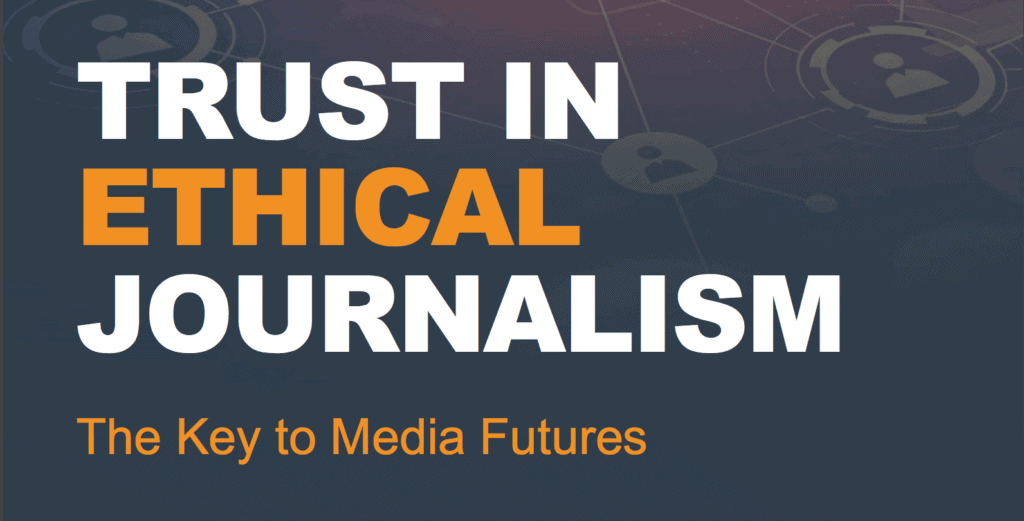Authors and Journalists’ Rights in Africa
Authors and Journalists’ Rights in Africa
To mark International Labour Day on 1 May 2018 the Ethical Journalism Network (EJN) and Federation for African Journalists (FAJ) organised a roundtable meeting to discuss the issue of copyright and raise awareness of authors’ and journalists’ rights in Africa. The event, which took place in Accra, Ghana at UNESCO’s World Press Freedom Day celebrations, was attended by journalists, media practitioners, editors and media owners.
The meeting was opened by Gabriel Baglo, the General Secretary of the Federation of African Journalists framed the problem within an African context and emphasised the need for the author’s rights to be respected. Baglo gave a pan-African picture of copyright problems in a digital age, why it’s important for journalists to be aware of their rights, and what journalists can do to retain their rights, especially using modern technology such as the watermarking of images.
Korieh Duodu, a Ghanaian lawyer told the meeting that it is time to refashion the protection of journalistic endeavours through the law of copyright, and for Africa to pave the way by tearing up the 19th-century rulebook in favour of a system that gives real protection – and value – to journalism in the digital age. Doing so, he argued, will strengthen the profession, at a crucial time when its role in increasing accountability and tackling corruption across the African continent cannot be over-emphasised.
In Duodu’s article for the EJN’s recent Trust in Ethical Journalism report he wrote:
It is, of course, impossible to generalise about the experience of African journalists. A writer in Ethiopia or Gambia may have more pressing concerns than whether someone is copying their articles. Africa’s patchwork of states neighbour those that engage in human rights abuses against journalists next to others enjoying diverse and free media. A common denominator, nevertheless, is the challenge journalists face in seeking to monetise their work, in the digital age of rampant abuse of copyright.
One key issue that has not been sufficiently analysed is the almost complete breakdown in literary copyright recognition, protection and enforcement across the African continent. Quite apart from the blatant and unethical copying of one journalist’s work by another, a more sinister force is at play.
The event also heard from Zakaria Tanko, a journalist and barrister who teaches copyright in Accra, as well as editors, owners and other participants from Ghanian media. The EJN’s director, Chris Elliott, chaired the meeting.
The round table is part of the Ethical Journalism Network’s programme to improve the knowledge and awareness of authors’ rights in Africa, supported by Kopinor – the Norwegian collecting agency that represents copyright holders of published works through 22 member organisations.
The EJN is in the process of developing an online toolkit for journalists to help them protect their rights in the digital age. For more information contact Chris Elliott.
World Press Freedom Day 2018
The UNESCO celebrations of the 25th World Press Freedom Day is taking place in Accra, Ghana on 2 – 3 May under the theme ‘Keeping Power in Check: Media, Justice and The Rule of Law’.
Source: https://en.unesco.org/news/registration-now-open-world-press-freedom-day-2018-accra
From 2 to 3 May, the WPFD 2018 international conference in Accra will encourage discussion and promote understanding and awareness about current challenges for freedom of expression. These include the role of media in elections, the independence and media literacy of the judicial system, and the accountability of state institutions to the public. The Day will also examine contemporary challenges of threats to press freedom online.
Across the globe, recent political, technological and economic transformations have placed new strains on press freedom. Within the UN’s Sustainable Development Goals making up its 2030 Agenda, the contribution of journalists and media workers is linked to SDG 16 on peace, justice and strong institutions.
In order to reach this goal, effective, accountable and transparent institutions at all levels must be developed, and press freedom. Essential to this is the right of all people in general, and journalists in particular, to use media platforms for public communication.
The main celebration in Accra will feature two plenaries, 15 breakout sessions, a youth newsroom, photo exhibitions and a film screening. On 2 May, UNESCO and the University of Ghana will organize an academic conference on the safety of journalists. For the first time, the academic conference will be followed by a Policy Lab (3 May), organized with additional support from the Global Development Network, that will foster interactions between researchers and policy actors seeking to build national mechanisms for the safety of journalists.
The deadline is fast approaching for the submission of nominations for the UNESCO/Guillermo Cano World Press Freedom Prize 2018. Eligible candidates are individuals, organizations or institutions who have made a significant contribution to the defence and/or promotion of press freedom anywhere in the world, and especially when this has been achieved in the face of danger.
Alongside the main celebration of World Press Freedom Day in Accra, national events will be organized in some 100 countries across all regions.
3 May acts as a reminder to governments of the need to respect their commitment to press freedom and a day of reflection among media professionals and internet actors about issues of press freedom and professional ethics.
